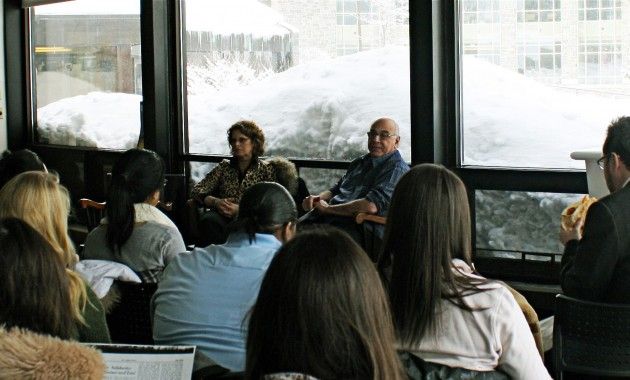On-Campus Civil Rights Protests Remembered
On Tuesday February 8, African American Studies and Women’s Study hosted a panel in the ALANA (African, Latin, Asian, & Native American) Cultural Center to discuss the international impact of the Civil Rights Movement and its relevance to Colgate University.
Russell Colgate Distinguished University Professor of Astronomy and Anthropology and Native American Studies Toni Aveni began the panel by illustrating Colgate’s atmosphere during the Civil Rights Movement. He emphasized Colgate’s significant progress in a mere 50-something years.
“Wave after wave of issues of social change washed upon campus,” Aveni said.
Focusing on “the transformative years,” 1963 through 1968, Aveni highlighted outstanding demonstrations of change at Colgate University, an institution that was dominated by a 98 percent white male population.
Upon mentioning his active involvement in the one hundred-hour sit-in at the Administration’s Office and spending three nights under the Dean of Students’ desk, the packed audience was immediately intrigued.
“I was impressed that a professor could take such interest in something that the students cared about so much. I was also surprised that an event like this happened at Colgate, and I’m proud that it did,” Junior Ali Atkinson said.
Aveni described the sit-in as a “gentlemanly sitting, unlike Berkeley or Columbia,” where 350 students and members of the faculty discussed the issue of alleged discrimination in selecting fraternity members. The administration responded by revoking charters and closing down certain fraternities.
Junior and current member of Beta Theta Pi fraternity Kyle Deombeleg was especially struck by Avini’s story.
“This sit-in has shaped the mold for a more diverse Greek Life community today with members coming from all racial and socio-economic backgrounds,” Deombeleg said.
Professor of Sociology Rhonda Levine pointed out how the Alana Cultural Center serves as an especially symbolic setting for this brown bag, as its foundation was an effect of the ’68 sit-in.
“Part of the student demands that followed from the ’68 sit-in was for curricular change including African American Studies and the need for a cultural center,” Levine said.
She supported the propertied rumor of Colgate University being the first out of the “Three C’s” (Colgate, Cornell, Columbia) to demonstrate radical social action.
“It is a great legacy you all have and you should all embrace it,” Levine said.
She continued the discussion with how she was particularly moved by personally meeting Robert F. Williams, an activist famous for being the president of the Monroe, North Carolina National Association for the Advancement of Colored Persons (NAACP) chapter in the 1950’s and 60s.
Serving as the moderator, Associate Professor of History and Africana & Latin American Studies Pete Banner-Haley briefly shared his favorite activists of this time, one being a Colgate Alumnus, Adam Clayton Powell ’30. Above all, he conveyed his faith in President Barack Obama’s confidence that “change is coming.”
As it is the beginning of Black History Month, the panelists invited participants to embrace Colgate’s history in the Civil Rights Movement and to take action.
“I don’t care how you feel, I want to see you do something,” Levine said.




